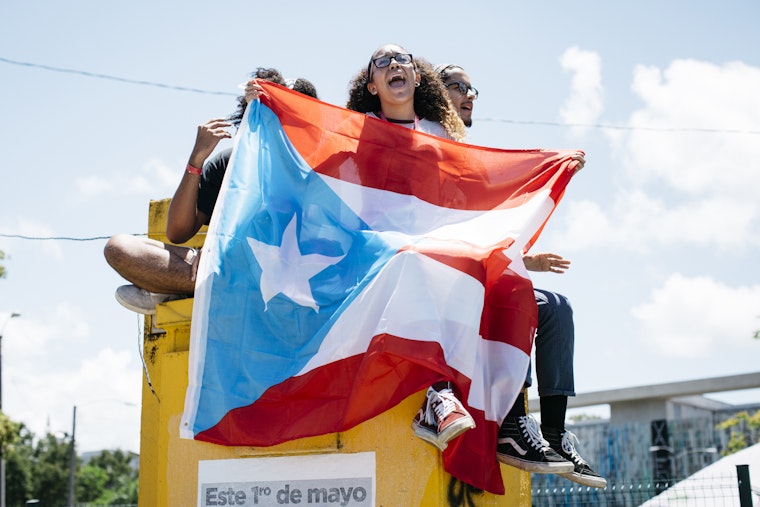Q&A: The Promise of Resistance in Puerto Rico

Puerto Rico is facing the worst economic crisis in its history. A fiscal control board created by Congress has proposed deep cuts to the University of Puerto Rico, which could create financial instability imperiling its accreditation. Karina Claudio Betancourt, a program officer with Open Society’s Open Places Initiative, spoke with Betza Collazo, a campus activist and 2017 Open Places Initiative Youth Exchange Fellow, about the situation.
Do you feel as though the strike last summer achieved significant gains?
Yes, I can say that among the strike’s achievements was having a group of students sit down with the fiscal control board and expose that their main objective with these cuts are to balance the budget and pay back the bond holders.
I can also say that the strengthening of the “social eateries” (Comedores Sociales de Puerto Rico) was another great success. These eateries permit students to exchange volunteer hours for a plate of food. Many students have to endure hunger. We have to choose between gas for the car, money for the Metro and food. There are many students with malnutrition because they lack money to buy food. These eateries are a way to tend to this crisis by forming a solidarity economy.
And finally, I think the students demonstrated that we could expose the abuses of the government and the fiscal control board. We made visible what’s happening in Puerto Rico through national and international media coverage of the strike.
How was this strike different from other strikes in the past?
I think this was different because it was a systemic strike, and it was endorsed by all 11 campuses of the university. It was also different because we weren’t necessarily concentrating on demands that pertained to us as students (in contrast to a 2010 strike that demanded a halt to tuition increases).
We the students want to imagine a project for the country, and our demands were broad: auditing the debt, no cuts to the university, no rise in tuition. And we oppose the austerity measures being imposed by the government and the fiscal control board.
What’s next for the student movement?
Our plan is to continue to organize in different committees to continue to recruit people from the general population and to help folks on the island understand that an attack against the university is an attack on all of our people.
Your project is about the impact of the Promesa law on public education. Why do you think it’s important to raise awareness about this?
An educated population will not let the government continue to make decisions that will further indebt us, and it will hold the fiscal control board accountable.
I am a product of public housing and public education, and I have lived in poverty all my life. Education has given me the opportunity to travel, have educational exchanges in other countries, participate in international competitions, and access job opportunities.
With this new labor reform (signed by Puerto Rico’s current governor, Ricardo Roselló), young people have less and less opportunity. But having an education at least gives me an advantage.
Who or what do you think is to blame for the current financial situation that Puerto Rico is in?
The fiscal control board is a modern-day example of what colonialism has done to our island. They are not here to ensure that we develop or grow our economy. They are here to balance the checkbooks and pay the bondholders and the vulture funds.
When Promesa was passed, many people thought that the fiscal control board was a good idea because it would hold local politicians accountable. But after almost a year of it being in place, people from all sides of the political spectrum—pro-statehood people and pro-independence people alike—increasingly understand that the fiscal control board is a way of delegitimizing our sovereignty, and many do think that the island’s colonial status is what brought forth the crisis.
What are some of the challenges that the movement is facing?
In Puerto Rico, people fear protesting in general, because of a history of U.S. repression that everyone has experienced or witnessed. When I go to protest, my mom always asks me to please be careful and to try not to get arrested. People are fearful of fighting back.
What future do you dream of for the island and its young people?
I’ve always liked to be idealistic and utopian but, as a young person, I am really scared about the future of Puerto Rico. Classes have started, and kids have been thrown into chaos, with no public transportation, overcrowded cafeterias, etc.
I went with my sister to help her register for classes, and there are barely any introductory courses. My sister depends on a (federal) Pell grant to pay for her tuition, food, and books. If the cuts are implemented, the university could lose its accreditation and people would lose this help. I am afraid that she will lose motivation and drop out of school, or not be able to afford it at all.
I know that the government and the fiscal control board are not thinking about the well-being of the people. And I think we will continue to see this grow if there’s no pushback.